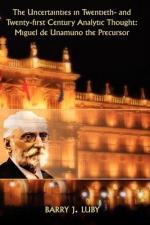|
This section contains 5,605 words (approx. 19 pages at 300 words per page) |

|
SOURCE: Balseiro, Jose A. “The Quixote of Contemporary Spain: Miguel de Unamuno.” PMLA 49, no. 2 (June 1934): 645-56.
In the following essay, Balseiro comments on the works and life of Unamuno, arguing that Unamuno himself was a quixotic thinker.
In his essay on Hamlet and Don Quixote, Ivan Tourguéniev stated that no man aspires to be called a Quixote. The Russian novelist did not presurmise the dream of Miguel de Unamuno. If the Knight-Errant makes clear that his duty binds him to protect the weak, relieve the oppressed, and punish the bad, Unamuno accepts and practices his creed. But Unamuno, being by far more quixotic than Cervantes, interprets the psychology of his hero, adapting it to his own way of feeling and thinking. In his work Del sentimiento trágico de la vida, he says, in relation to another of his masterpieces, Vida de Don Quijote y Sancho:
Escrib...
|
This section contains 5,605 words (approx. 19 pages at 300 words per page) |

|


